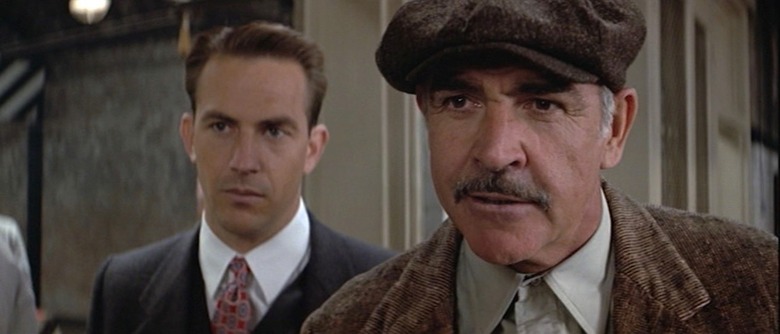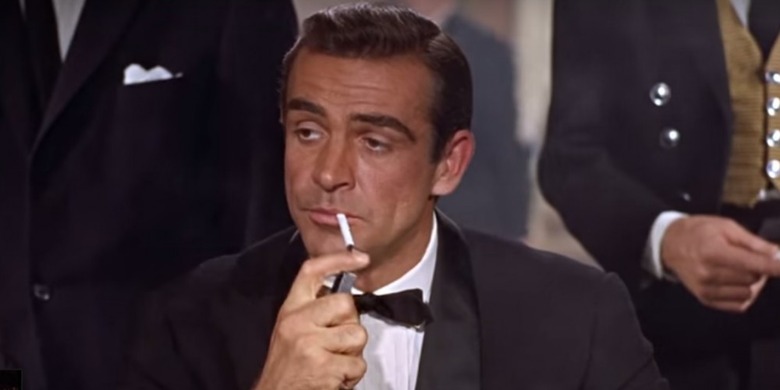Charting Sean Connery's Transformation From "Hairy Marshmallow" To Cinema Legend
(Welcome to Role Call, where we examine two performances from an actor – their first defining role and their latest/last – to get a sense of who they are.)Sean Connery should never have been James Bond. Author Ian Fleming's vision for the character was a bit more debonair, a bit sleeker, a bit more refined. Not, as Fleming described Connery, an "overgrown stunt man." But cinema has a funny way of reshaping authors' visions, overriding them until we can't help but see the actors' faces when we're reading.
So Connery is the eternal Bond. Maybe a bit gruffer than Fleming intended, but every Bond since has chased Connery's portrayal not solely because he had the advantage of defining the role on the big screen by being first, but because he defined it successfully in the eyes of millions and millions of fans.
The Genre King
Connery has always been a Scottish John Wayne. A man's man who was leather-bound enough for the time and the territory. Whereas Wayne lorded over the Western – tugging mid-century movie fans into a romantic vision of personal sovereignty, fresh air, and flattened history – Connery got the job done during the dirty secret-stealing of the Cold War. He played Bond as a cowboy, flinging himself recklessly into bed sheets and shootouts. He trotted the globe from saloon to saloon with a gun at his side. He rode a steel horse that could sometimes be a submarine.
And just as he defined Bond, Bond defined him.
There are at least two ironies that leap out when you consider Connery's persona and acting style over the course of his career. The most obvious one is that he was worried about signing up for Bond because he thought he'd be tied down to a single franchise and held captive by one character. The second we'll get to later, but to unpack the first, let's take a look at the role that put Connery on the map.
His Early Role: James Bond in Dr. No
Yes, the spy who loved everyone is the obvious choice for cementing his style, but you can't consider Connery's acting legacy as Bond without taking a brief detour to his brief career before the breakout.
The bodybuilder and footballer got his start in a touring production of South Pacific where he rose through the ranks from chorus to featured performer. Connery pursued the theater while earning small roles in television shows and movies before landing a co-starring gig as a romantic lead in the wartime love affair Another Time, Another Place and as a song-happy love interest in Disney's Darby O'Gill and the Little People.
It's difficult to see Bond in there.
All of these roles required Connery only to be handsome, tall, and charming. Which he was. Without hindsight, it would have been impossible to predict that the kind smile stacked on muscles would ascend to globally known megastar a few years later.
It's totally plausible that Connery would have made a name for himself with another role and ascended into the ranks of movie stardom, but Dr. No gave him a jet pack to the top. Fleming's were popular, pulpy novels, and Bond already had his hard edges defined.
Connery shone in the role because it gave him a personality while he was shaping one for Bond. As John Wayne was heading into his Oscar-winning twilight years, Connery offered another strutting machismo cannon for audiences to swoon over and roll their eyes at.
The Persona: Bond...James Bond
Rare for young actors (and probably for this column going forward), you don't need deep analysis to figure out how an early role created our vision for the performer. Connery was Bond. In fact, a lot of people still see him as the only Bond. The one true Bond.
But it's worth pushing back on how we saw Connery as Bond through modern eyes by checking out how some thought of him in 1962. Like the Time reviewer calling him "a great big hairy marshmallow," and New York Times critic Bosley Crowther recognizing immediately that the Bond movie was a spoofy bit of fun nonsense. So let's take the concept of Connery as a steely-eyed badass ready with a stiff drink and an uppercut with enough salt to rim a martini glass.
No doubt he was popular. He anchored a huge franchise. He made Bond and Bond made him. And as much as he initially hesitated to take a role that might pigeonhole him later on, he hewed close to the genre world, expanding his acting persona beyond Bond only slightly by being a rugged detective or a rugged soldier until his Bond run was done.
Then he did Zardoz.
His Latest Role: Allan Quartermain
The second irony that I mentioned before is that, while Connery was concerned that Bond would define him, it did, but then it didn't matter. He was able to embody Bond for decades while pulling away just enough to forge non-Bond characters that still didn't ask him for the world's widest emotional range.
Connery's final film role before retiring in 2003 was playing the harried, legendary adventurer Alan Quartermain in The League of Extraordinary Gentlemen, and it's hard not to see his portrayal as a gray-bearded Bond diving into trouble with a pistol at his side. An elder statesman, as if 007 had sought retirement in Africa to take it easy but still wrestle with large animals from time to time.
It's at least a little curious, though, that he'd be willing to be the aging hub of an ensemble for a comic book adaptation that could have become another franchise albatross to hang around his neck if it had been successful.
The New Persona: Old James Bond
Still Bond. After all those years. After getting a little grittier in The Rock, a little kinder in Medicine Man, and a little crazier in Highlander, it's clear that he didn't stray far from the role that initially made him famous. It's arguable that the further departure was as the semi-doofy-yet-still-sexually-rigorous Henry Jones Sr. in Indiana Jones and the Last Crusade was his furthest departure (or maybe Finding Forrester), but he was still a king of genre. An emblem of rugged adventure and map-crossing excitement.
Friend and colleague Michael Caine said that the industry had retired Connery because he wasn't interested in side roles for old men, but things also went infamously bad on the set of Extraordinary Gentlemen, and Connery himself said he was, "fed up with the idiots. . . the ever-widening gap between people who know how to make movies and the people who green-light movies," in confirming his retirement.
So we most likely won't see Connery on screen again, even as Bond lives on with his name forever hanging over the role. He shaped it, and it shaped him. He never fully shed that image, but he still managed to have a hell of a career, and I doubt anyone ever called him a hairy marshmallow to his face.


